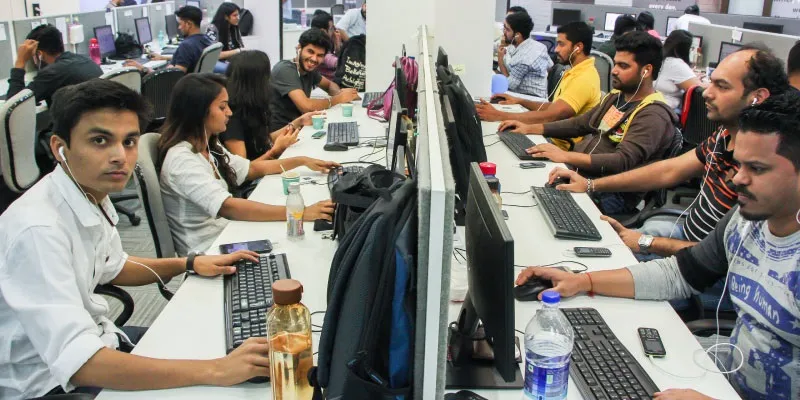With limited resources, Truebil's first workforce included interns and freshers
For any startup that harbours long-term ambitions, surviving the first year of operations and coming out unscathed is the key. The first year brings with it self-doubts, human resource challenges, issues with co-founders if there are multiple partners, financial crunches, and market challenges. Tiding over these difficulties and surviving to tell the story by making it to the second year takes guts and perseverance, and only a few are blessed with it. YourStory is happy to present a new series of articles as part of the series Survival Instinct that track how leading startups battled the demons and survived the first year of their operations. Today we bring to you Truebil.
Shubh Bansal, co-founder of Truebil, says they worked with interns and hired freshers as they didn’t have sufficient funds to hire engineers.
They say 'Well begun is half done', but for startups with limited access to capital and talent, the beginning is always a rough ride. For Mumbai-based used car marketplace Truebil, the entrepreneurial journey, unsuspectingly, started when the founders were looking for a used car.
It was in November 2014 that the three co-founders - Shubh Bansal, Suraj Kalwani and Ravi Chirania- together decided to buy a used car. The hunt was clearly not an easy one as when the trio drove back a car, they also drove out an entrepreneurial idea. The idea was to provide a solution to buyers while they purchase a used car.

The decisive moment to quit and startup
Shubh, Suraj and Ravi were working at Housing.com in 2014, and even with a business idea, they were in a dilemma whether to quit or continue working. “We didn’t want to do two things at the same time – either work at Housing or do research for our startup,” says Shubh.
Ultimately, they went by their instinct and decided to kick-start their entrepreneurial journey. Of course, the three co-founders, who were all 24-year-olds then, had to convince their respective families of the prospect of new-age companies.
The research and trial
“The first problem we faced was people were not entertaining us. Clients told us that we are children, and why should they trust us,” says Shubh.
“We decided to go to a C2C marketplace for used cars and give our inspection reports to sellers and buyers. Though we wanted to hire inspection engineers for the job, we ended up hiring a fresher, as we didn’t have sufficient funds. He stayed with us in the same apartment, and we promised to take care of his food and shelter without any salary, and he obliged,” says Shubh. The first business for the startup came from within the residential society where their apartment is located.
During the research phase, the team tried to create and test the business model and find out whether there was a real value proposition. While there were many listing and classified portals to dispense information about used cars, there were limited options as far as end-to-end service providers for used cars was concerned. The team decided to not only inspect and certify used cars, but also offered to complete the paperwork and other paraphernalia needed to sell and buy used cars.
Bootstrapping and improvising
“Initially, we used an old domain called ‘GrandFurnish.com,’ and we wanted to develop our backend and platform.”
“We didn’t have a team, and that’s when three other co-founders - Rakesh Raman, Ritesh Pandey and Shanu Vivek - joined us, and we started working on the product. Rakesh and Ritesh, with the help of a couple of interns from IIT Bombay, built truebil.com portal. All the co-founders, along with the freshers and interns, stayed and worked in the same apartment in the Powai area of Mumbai, which doubled as our home-office. We also hired a call-centre employee to contact our clients,” recalls Shubh.
Initially, the team didn’t want to wait for the product to be developed. The plan was to go out to the market and start operations, and simultaneously develop the product. They started their market research using the old domain, while a fresher they had hired started inspecting used cars put up for sale on online platforms. The inspection was free-of-cost at that time. The team uploaded the inspection report at GrandFurnish, and mailed the links to sellers, who in turn used it to provide it to buyers.
Other challenges
Truebil.com went live on January 2015. But, there was a time when everyone in the team was going through a difficult phase and was under pressure.

“There used to be nearly fifteen of us working and living in the same apartment. Some of our founders were unwell when the discussion for the first round of funding took place.” The flat is still there with them. Many
founders got married and moved out. Currently only one co-founder, Himanshu Singhal lives in that apartment.
The team could breathe a sigh of relief when they raised their first round of funding from Kae Capital in March 2015. “We hired our first employee and rented a bigger place to work from. Hiring and marketing also became much easier after we raised funding.”
From then, the startup took off. Truebil has achieved more than an annualised revenue of Rs 120 crore this year. The journey also kept adding more people, and today the firm has close to 200 employees across Delhi, Mumbai, and Bengaluru.
Advice to fellow startup brethren
Shubh says if there is no product, just go out and start the operations. It is important to figure out what the market requires. There is no systematic plan for startups, and the sequence is not very important. You cannot think of doing things in a perfect way. Corporates wait for the process and products to develop. But for startups, they are right on the field from day one.







